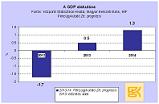The idea of concluding privatisation in Hungary first arose in 1997. Since then, two governments have considered the proposals and turned them down. In our estimation, the postponement occurred for short-term political-power reasons rather than for well-grounded economic considerations. Even in this case, however, economic rationality remained undamaged, as a fair number of companies could be still sold during recent years, though at varying rates. At the end of 2004 it did not appear impossible that with a few exceptions the state assets in the competitive sector would soon be acquired by new owners. The principle can thus be confirmed that privatisation is worth declaring completed if it has really been concluded, i.e. when the assets to be sold and able to be sold have been acquired by private companies.
In: Állami vagyon ? privatizáció ?gazdasági rendszerváltozás, ÁPV Rt. (State Assets ? privatisation ? economic transition, State Privatisation and State Holding Company) 2005, Számadás a talentumról sorozat ("Giving account of the talent" series) pp. 16-43
Tovább»





